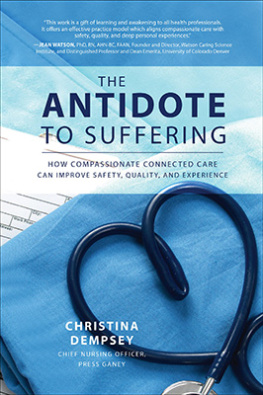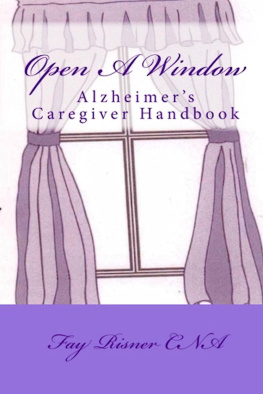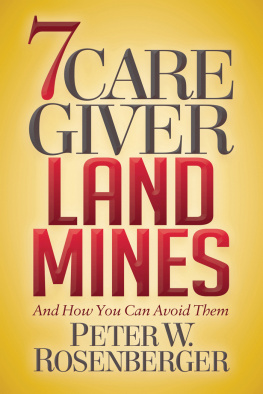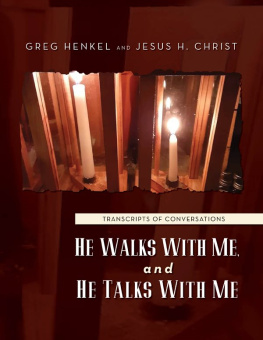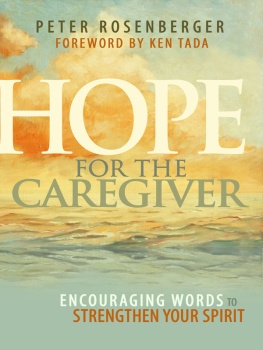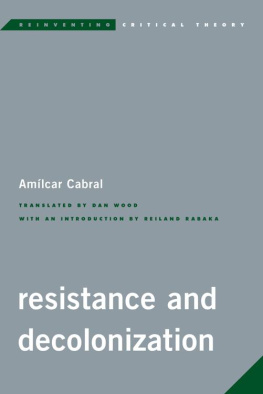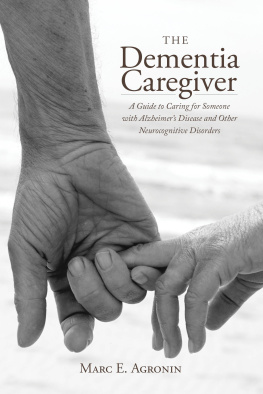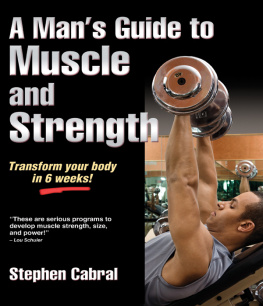Joseph Cabral - The Engaged Caregiver
Here you can read online Joseph Cabral - The Engaged Caregiver full text of the book (entire story) in english for free. Download pdf and epub, get meaning, cover and reviews about this ebook. year: 2020, publisher: McGraw-Hill Education, genre: Romance novel. Description of the work, (preface) as well as reviews are available. Best literature library LitArk.com created for fans of good reading and offers a wide selection of genres:
Romance novel
Science fiction
Adventure
Detective
Science
History
Home and family
Prose
Art
Politics
Computer
Non-fiction
Religion
Business
Children
Humor
Choose a favorite category and find really read worthwhile books. Enjoy immersion in the world of imagination, feel the emotions of the characters or learn something new for yourself, make an fascinating discovery.
- Book:The Engaged Caregiver
- Author:
- Publisher:McGraw-Hill Education
- Genre:
- Year:2020
- Rating:5 / 5
- Favourites:Add to favourites
- Your mark:
- 100
- 1
- 2
- 3
- 4
- 5
The Engaged Caregiver: summary, description and annotation
We offer to read an annotation, description, summary or preface (depends on what the author of the book "The Engaged Caregiver" wrote himself). If you haven't found the necessary information about the book — write in the comments, we will try to find it.
The Engaged Caregiver — read online for free the complete book (whole text) full work
Below is the text of the book, divided by pages. System saving the place of the last page read, allows you to conveniently read the book "The Engaged Caregiver" online for free, without having to search again every time where you left off. Put a bookmark, and you can go to the page where you finished reading at any time.
Font size:
Interval:
Bookmark:
If you enjoyed this book, discover your next great read with the following excerpt.
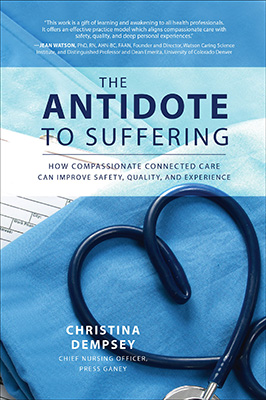
1
An Epidemic of Suffering
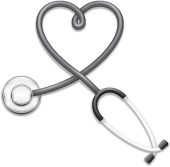
IT WAS JULY 24, 2013, a Wednesday. My husband, Tom, and I were at the hospital, sitting in a small, windowless nurses office before a desk laden with folders and papers. For years, I had worked in an office just like this one as a nurse administrator. But sitting here on this day was like no other experience I have ever had. This time, I wasnt the nurse, conveying the results of a cancer biopsy. I was the patient.
Many nurses see death up close. And thanks to this proximity, some of us come to feel less afraid of it. Not me. Rationally, I knew that I probably didnt have cancer. My doctor had told me that 80 percent of the time, the biopsies were benign for the kind of calcifications in my right breastheterogeneous and BIRADS 4that a routine screening mammogram had turned up. But frightening thoughts kept racing through my mind. What if I did have cancer? In that case, my life would change forever. I would be a cancer patient, a statistic. And the cancer might have spread to my bones or my brain. I might lose my hair from the chemo. I might die.
When I feel stressed, I dont cry. I get quiet and withdraw into myself. Thats what I did here. Well, the nurse finally said, looking me in the eye, Its not what we had hoped for. You have cancer, both DCIS and invasive. DCISor ductal carcinoma in situis a form of breast cancer that has not spread beyond the duct in the breast. But I had both: the noninvasive kind and the kind that could spread and kill you.
I felt numb. The nurse proceeded to tell me about my disease and the prognosis, but I couldnt absorb any of it. I remained stoically silent, nodding my head at the appropriate times. Then, as my husband and I got up to go, the nurse complimented me on the gold bracelet I was wearing. When she said that, I began to sob. This piece of jewelry was very special to me: the year before, my husband had surprised me with it on Christmas. My husband held my hand as we walked out of the office and into the strange new world of cancer.
I wasnt the only one who was terrified. Later that day, Tom broke down and cried for maybe the fourth time in 30 years. My daughters, my mother, my sister: All of them were worried. Nobody in our immediate family had ever had breast cancer. Would I be OK? Would I need chemo, radiation, or some other therapy? What would happen with my job? And what would it mean for my family, especially my sister and daughters? I was supposed to be the rock in the familystrong, brave, the person who had all the answers. Now I had more questions than answers. I was feeling incredibly vulnerable and out of control.
As anxious as we all were, it could have been a lot worse. Because I had a medical background, the language that my nurses and doctors were using was familiar to me. I knew exactly what questions to ask and how to perform medical research, so I wasnt confused or uncertain about my treatment. I could convey my knowledge to the loved ones who worried about me. Imagine what people who dont know much about medicine must go through. I was also extremely fortunate to have a secure job at Press Ganey, with a boss, colleagues, and an organization that went out of their way to show their support. When I told our president, Joe Greskoviak, of my diagnosis, he said to me, Christy, I want you to know that this is when you focus on you. You are our CNO, and you will continue to be our CNO. Dont worry about your job for another second. I cant tell you how much that relieved me, as did all the cards people sent me letting me know that they were thinking of me. Imagine what it must be like for the many patients who dont have this support. These patients are not merely frightened about their medical diagnoses, but about everything in their lives that now seems at risk. We wonder as caregivers why our patients are often angry, sad, distant, and distressed. Now I knew: its scary to be a patient.
But my suffering as a breast cancer patient was by no means over. Once I had selected a surgeon who would remove the tumor, I had to undergo an MRI of both breasts so that we would know more about the scope of the surgery and the prognosis. The week after my biopsy, I found myself prone on an exam table and completely alone, save for a technologist on the other side of the MRI machinery. The MRI is loud and confiningequally scary for people who have never been in one and for those who know how they work and what they do. The preliminary results not only confirmed the cancer in my right breast; it showed four suspicious areas in the left breast as well. At this point, I was really scared. If the cancer was in both breasts, where else might it be? A follow-up ultrasound would provide some answers, but I had to wait two days for that. The waiting was excruciating. I just wanted the cancer out of me!
The ultrasound turned up nothing bad in the left breast, but I still had to decide whether to have a lumpectomy or a full mastectomy, and on one side or both. This was a very difficult decision for me. I had always thought that it wouldnt bother me to lose both my breasts if I ever had cancer, but now I wasnt so sure. When you have a lumpectomy, the breast is often misshapen but there is still breast tissue. When you have a mastectomy, all of your breast tissue is removed, including the nipple. You can have nipple-sparing surgery so that the surgeon can reattach your nipple after your mastectomy and during reconstruction, but the sensation is never the same. I talked with my family and my husband for hours trying to make this decision. And I had to think about all of this as I was still working hard at my job, dealing with my baseline anxiety about cancer, and trying to maintain some sense of normality for my family.
Other procedures leading up to my mastectomy brought torments big and small, some of which Ill recount later in this book. Perhaps my greatest misery occurred after surgery. Awakening in the recovery room, I was taken to a shared room, where I would spend the night with another patient as my roommate. I was in a great deal of pain, so I pushed the call light to ask the nurse for medication. She said that I could have something in 20 minutes and that I should remind her. I was somewhat taken aback. Im the patient, I thought, I have to remind you? I just had surgery. I cant even think straight! My husband did remind her several timesstill no pain medication.
I was hurting so much that I couldnt sleep. It didnt help that alarms were constantly going off, people were talking in the hallway just outside my room, and my roommate was shrieking with her own uncontrolled pain. Repeatedly I awoke thinking that an hour had passed, when it had only been a few minutes. I asked for earplugs, but the nurses didnt have any. My husband found some in the gift shop, and they helped a little. But then a nursing assistant came in and said I had to get up to go to the bathroom. After she made the necessary preparations, I walked slowly over to the toilet. She seemed in a hurry and somewhat frazzled, so I asked her how many patients she had that night.
Eleven, she replied.
How many does your nurse have?
Six.
Thats a lot, I said, entering the bathroom.
She shrugged. It isnt that we have that many patients. Its just that everybody is so needy tonight.
That response confused me and made me feel a bit defensive. Did she mean me? I was trying not to be a pest or push my call light all the time. The last thing any patient wants is to be thought of as needy, especially a patient like me who also happens to be a nurse.
Next pageFont size:
Interval:
Bookmark:
Similar books «The Engaged Caregiver»
Look at similar books to The Engaged Caregiver. We have selected literature similar in name and meaning in the hope of providing readers with more options to find new, interesting, not yet read works.
Discussion, reviews of the book The Engaged Caregiver and just readers' own opinions. Leave your comments, write what you think about the work, its meaning or the main characters. Specify what exactly you liked and what you didn't like, and why you think so.

